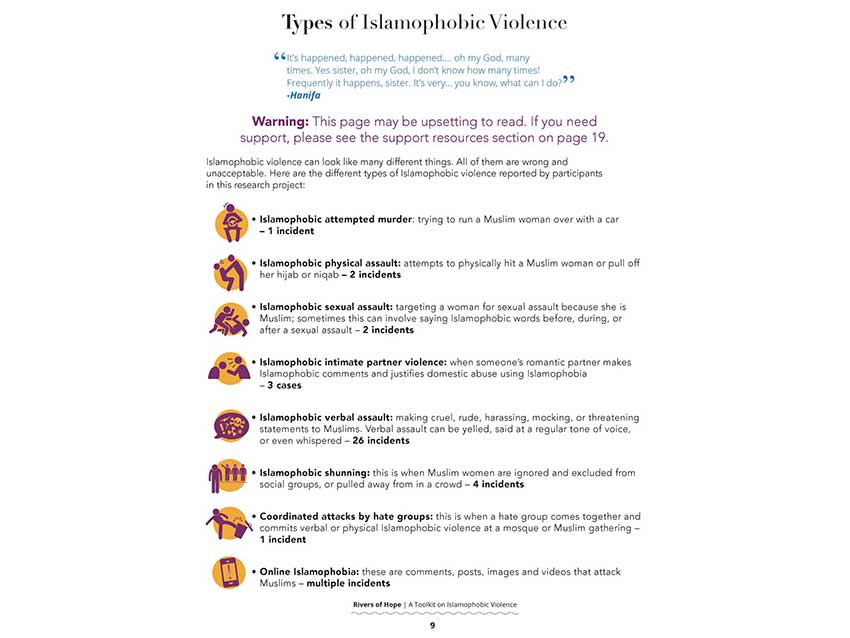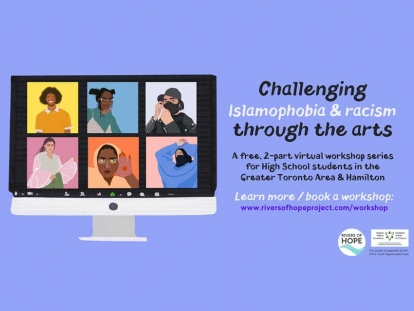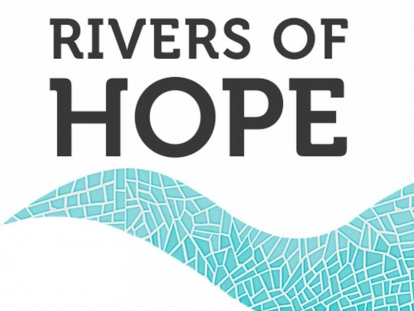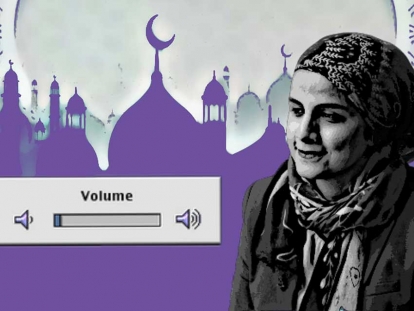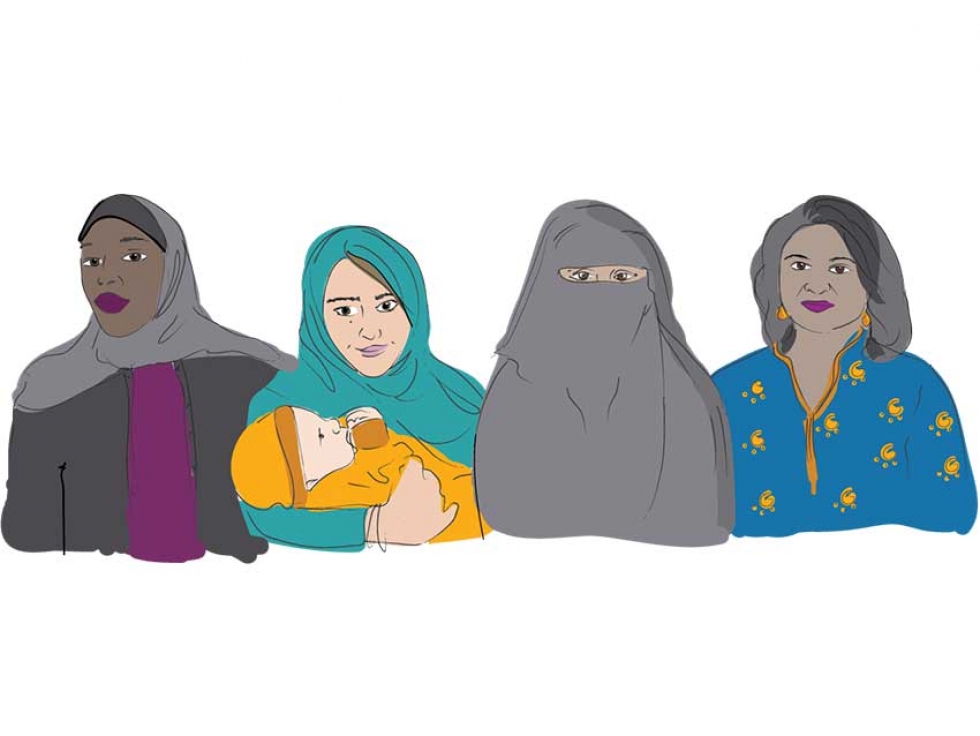 Sidrah Ahmad, the researcher behind the Rivers of Hope Toolkit, discusses sexual assault that is motivated by Islamophobia and how to support survivors.
Azza Abbaro www.azzaabbaro.com
Sidrah Ahmad, the researcher behind the Rivers of Hope Toolkit, discusses sexual assault that is motivated by Islamophobia and how to support survivors.
Azza Abbaro www.azzaabbaro.com
Apr
It’s Time to Support Survivors of Islamophobically-Motivated Sexual Assault
Written by Sidrah Ahmad ChanFor Sexual Assault Awareness Month (#SAAM), let’s raise awareness about Islamophobically-motivated sexual assault, and all forms of sexual violence Muslim women face.
Muslim women are most often the targets of Islamophobic violence in North America and Europe, with visibly Muslim women – women who wear hijab and/or niqab – being particularly vulnerable. Black Muslim women also face heightened vulnerability to Islamophobic violence, because of the combined effect of anti-Black racism and Islamophobia.
When we think about Islamophobic violence against Muslim women, we often picture a woman being yelled at to “go back to where you came from” or even physically attacked. What’s been missing from the conversation however is the fact that Islamophobic violence can take the form of sexual assault.
Over the past year, I conducted research interviews with 21 Muslim women survivors of Islamophobic violence in Toronto and its surrounding regions. Throughout these interviews, Muslim women of all ages told me about being verbally harassed, threatened, and physically attacked. Importantly, some of them also told me about incidents of Islamophobically-motivated sexual assault.
What is Islamophobically-Motivated Sexual Assault?
Sexual assault is any form of unwanted sexual activity or contact. It can include rape, unwanted sexual activity, groping, or unwanted sexual touching. Sexual assault, despite its name, is not about sex – it is about exerting power and control over someone using sexual violence. Sexual assault can have severe physical, sexual, emotional, mental, financial, and spiritual impacts on the survivor. Survivors of sexual violence often live with post-traumatic stress, including anxiety, hypervigilance, and flashbacks, and they may struggle with blaming themselves for the violence committed against them.
Islamophobically-motivated sexual assault is when someone targets a Muslim woman or girl for sexual assault because of her identity as a Muslim woman or girl.
What harmful ideas lead people to commit Islamophobically-motivated sexual assault? For the most part, the cause is something called gendered Islamophobia. Gendered Islamophobia is the specific kind of stereotypes and discrimination that are faced by Muslim women. For example, the stereotype that Muslim women are weak, passive and repressed victims, or that they are exotic, or that they are terrorists and ‘enemies of the West’. All of these harmful ideas can make Muslim women and girls more vulnerable to Islamophobically-motivated sexual assault, because they motivate abusers to target Muslim women and girls for their crimes.
Sexual assault can be understood as “Islamophobically-motivated” if the perpetrator makes Islamophobic statements before, during, or after the assault, or otherwise demonstrates subtle or obvious Islamophobic attitudes or beliefs. For example, the perpetrator may call a Muslim woman “a terrorist”, and then sexually assault her. Or he may say “I bet your husband abuses you too” during a sexual assault, thereby using gendered Islamophobic stereotypes to “justify” his violence. Or he may sexually assault her and then deny that it was assault by implying that she is “a naïve and oppressed Muslim woman” who doesn’t really understand what consent is. He may have a track record of Islamophobic posts online, or fetishizing Muslim women.
Islamophobically-motivated sexual assault rarely makes it to the mainstream news or popular conversations around Islamophobia. However, one high-profile incident of Islamophobic violence on the Vancouver Skytrain last year received a lot of media coverage. In this incident, there was a physical attack and an attempted sexual assault reported by the teenage Muslim girl survivor. Specifically, the perpetrator tried to force her head towards his groin during the attack. Thankfully, in that incident, a bystander intervened. But in the aftermath of that incident, the media and our communities did not spend enough time discussing the impact of Islamophobic sexual violence on Muslim women and girls.
It is vital to understand that perpetrators of Islamophobically-motivated sexual assault hide or excuse their violence by using Islamophobic stereotypes about Muslim women. For example, in order for sexual activity to be legal, there needs to be consent – that is, both people involved need to give ongoing permission and agree to the sexual activity. But in the case of Islamophobically-motivated sexual assault, a perpetrator might brush aside the need for consent by claiming that Muslim women are so naïve and “sexually repressed” that they don’t know how to give consent. Or he might claim that the Muslim woman he is targeting is so oppressed that his sexual assault is somehow her “liberation”. Or, he may say that she seduced him into assaulting her – that he was somehow the victim of an exotic, evil, terroristic Muslim woman.
These kinds of twisted justifications show us why it is important to challenge Islamophobia and gendered Islamophobia on a daily basis.
https://twitter.com/hearttogrow/status/983446951898374144
How Can We Support Survivors of Islamophobically-Motivated Sexual Assault?
Believe her
The first way we can support a Muslim woman or girl who has lived through Islamophobically-motivated sexual assault is to believe her. Islamophobically-motivated sexual assault, like any form of sexual assault, isn’t only perpetrated by strangers. It can be committed by a romantic partner, a friend, an acquaintance, a co-worker, or a boss. So even if a survivor tells us that someone we know – and perhaps trusted – harmed her in this manner, it’s important to believe her. Even if the person who assaulted her is a prominent activist who is a valuable political ally to the Muslim community, her story should take priority over his activist reputation. Be aware that many abusers work hard to create an impressive public profile so that they can hide what they do behind closed doors. For great examples of what to say to survivors of sexual violence, check out this video put out by Muslim-run organization HEART Women and Girls.
Don’t blame her
There is nothing that any Muslim woman can do that would justify sexual assault against her. Even if she was somewhere alone with the perpetrator, or not wearing hijab, it’s important to remember that NONE of this means that it is her fault for being sexually assaulted. So many Muslim women and girls don’t come forward to share what happened to them because they are afraid the community will judge them and blame them, instead of holding the sexual assaulter accountable. Make no mistake: Muslim women have been sexually assaulted when wearing full abaya. Just look at the stories about sexual violence being reported at Hajj. In the case of Islamophobically-motivated sexual assault, perpetrators may be targeting Muslim women and girls who already feel insecurity or shame about their place in the Muslim community, because they know they are vulnerable and can be threatened or manipulated. It’s time we embrace all Muslim women and girls into our community without judgement.
Don’t stigmatize her
According to Farheen Khan, a writer and activist, “As a survivor, often the major concern of loved ones is the perception of how the community will feel if they came to know that a woman has been assaulted. Many worry whether people would assume that she was raped and if so about the chances of being ‘married’ after becoming ‘damaged goods’.”
As a community, we need to get rid of the idea that being a survivor of sexual violence is damage or shameful. 100% of the shame and blame from the sexual assault belongs to the abuser. It is not the survivor’s shame to carry. Farheen has since become an outspoken advocate around Islamophobic violence. “Once I made my story public,” Farheen said, “I realized just how unfounded the fears of those around me were. Many were supportive of my story and thought I was braving in sharing it so publicly. But there many that even to this day no longer speak to me because they believe that I was ‘airing the community's dirty laundry’. On the contrary, my intention in sharing my story is simply to raise awareness that when leaders (elected or unelected) use hateful Islamophobic rhetoric, there is a direct impact on the physical safety of Muslims and in particular of our women.”
https://twitter.com/globalnews/status/981837617724608512
Support her choices and help meet her needs
Don’t pressure her to report the incident or take any specific course of action. It’s up to her. Sexual assault is a terrifying experience that makes the person being targeted feel like she has lost control over her body and life. So it is very important that she regains a sense of control through her healing process. As her support person, the best questions you can ask her are “How can I support you?” or “What do you need?”. From there, you can direction from her. In some cases, her immediate need might be for financial assistance, because the trauma from sexual assault can prevent someone from working, and therapy can be expensive. If she agrees to it, consider finding donations for her, while keeping her identity and story completely confidential.
Connect her with resources
Look up support resources for survivors of sexual violence in your community, such as rape crisis centres and sexual assault treatment centres. A good place to start your inquiry is the Assaulted Women’s Helpline, which is a confidential 24/7 helpline in Ontario. It may take a bit of trial-and-error, digging, and patience with waiting lists to get her meaningful support, but it’s worth the effort.
Muslim-run helplines such as Nisa helpline and Naseeha Muslim youth helpline are also available to support her. Finally, the Rivers of Hope Toolkit is a free online resource for survivors of Islamophobic violence that contains helpful information, research, tips and poetry by survivors. It also has lists of support resources and reporting options.
Check in with her and stay connected
Surviving sexual violence can be very isolating. Be sure to stay connected with the survivor and check in with her over the weeks, months and years ahead. Commit to being a part of her ongoing support system, if she is open to you taking that role.
Farheen Khan summarizes some of these steps on how to support survivors really powerfully: “My advice is simply that if a woman does disclose then first and foremost believe her. Then ensure that she reports (if she chooses) and that she get justice, whatever that may mean for her. She is no less of a woman or a person for being mistreated by someone that had hateful intentions and actions. Encourage her to reach out to other survivors and to agencies that can support her in her healing journey.”
Raising Awareness About Islamophobically-Motivated Sexual Assault
As Muslims living in Canada, we live with the dilemma that the media is quick to profile sexual violence that happens within Muslim communities, and often covers these stories in Islamophobic ways, but we don’t often hear stories about Islamophobically-motivated sexual assault or attacks on Muslim women by non-Muslim men. This media bias and double-standard might make us want to shy away from conversations of sexual violence altogether. But we cannot shy away. It is our duty to speak out both about sexual violence in all forms, both inside and outside of our community. We can begin by taking the lead from Muslim women survivors who are speaking out and creating change. They deserve our respect, support, and care.
So far this article has focused on Muslim women survivors of Islamophobically-motivated sexual assault, but it’s important to note that Muslims of all genders can be targeted for sexual violence. All across our community, it’s important that we break the silence and stigma so that all survivors feel safe enough to come forward. As it stands, too many Muslims are carrying these stories silently within themselves, finding no place to discuss what they went through. It is my hope that during Sexual Assault Awareness Month, our community breaks open the conversation about Islamophobically-motivated sexual assault, and all forms of sexual violence, and takes bold steps forward to support survivors. Every action we take to raise awareness counts. All of it will go a long way towards breaking the silence and creating room for more survivors to come forward, be believed, and continue to heal within our communities.
May we all find peace, Inshallah. Ameen.
Visit the Rivers of Hope Toolkit website here
This article was produced exclusively for Muslim Link and should not be copied without prior permission from the site. For permission, please write to info@muslimlink.ca.


